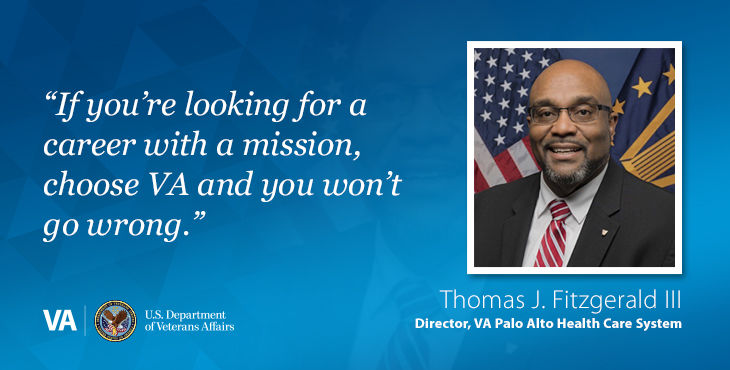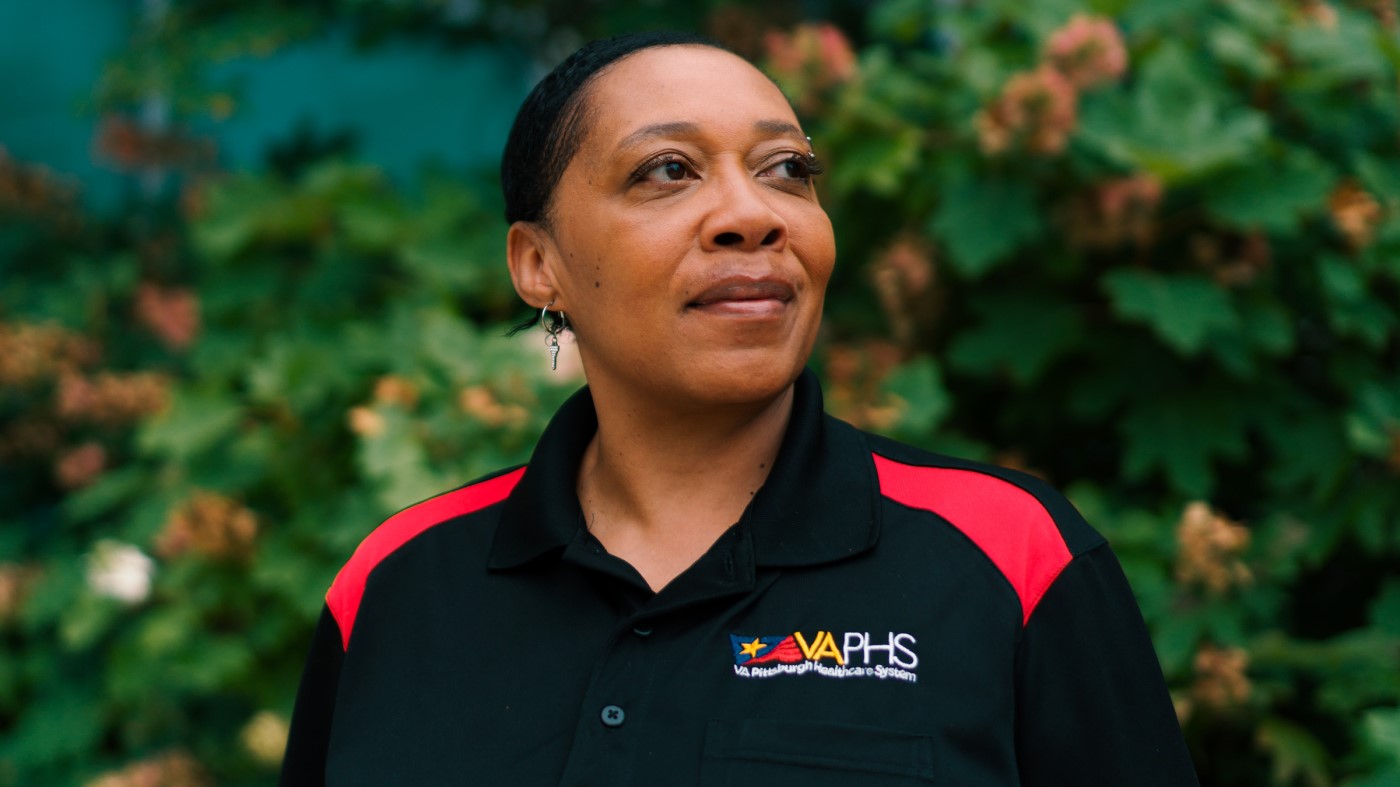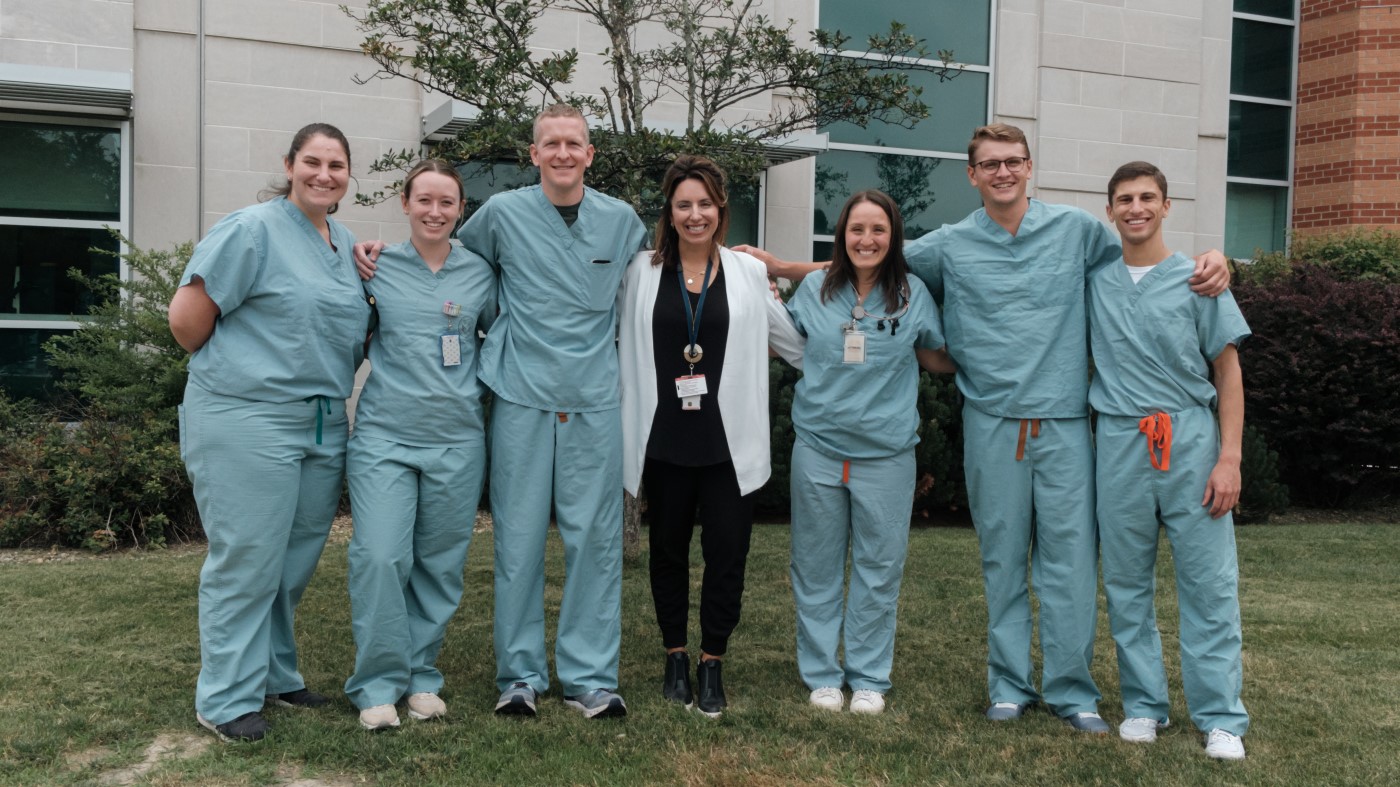Going from Nursing Assistant at the Captain James A. Lovell Federal Health Care Center in North Chicago to Director of the VA Palo Alto Health Care System (VAPAHCS) obviously didn’t happen overnight for Thomas J. Fitzgerald III. But that it happened at all, he says, is credit to numerous career opportunities in his 32 years with VA and a steadfast commitment to helping other Veterans.
As head of one of the most complex facilities in the VA system, Fitzgerald oversees an annual budget exceeding $1.1 billion. He directs more than 7,000 employees and volunteers and serves patients in facilities with nearly 900 beds. He also manages numerous special programs and, in his little spare time, cheerleads for VA’s Intermediate Care Technician (ICT) career pathway for former military corpsmen and medics.
In this installment of our #ChooseVA Careers blog series, Fitzgerald explains why a VA career was a calling after military service and why VA is a great career choice for transitioning military personnel.
Describe some of your day-to-day duties as Director of the VA Palo Alto Health Care System.
I hold huddle meetings every morning with my executive leadership team. This way, we know what’s happening and what’s getting in the way of providing daily care. I speak to employees and patients nearly every day. I have operational meetings regarding business requirements — looking at outcomes data, our budget, wait times and things that promote a high reliability organization.
Describe your areas of specialty and how you apply them in the care provided to Veterans.
May 3 marks my 38th year in health care. I wanted to help people the way they helped me when I was in the hospital for four months after being hit by a motorcycle. I went to the North Chicago VA Medical Center to become a nurse’s aide because that’s what VA had for medics — they didn’t have an ICT program back then. Since I wanted to help people, I kept developing my skills at being a “helping” person. I try to live that mission every day.
What was appealing about a career at VA?
I had the opportunity to continue serving those who, like me, have served their country — and to provide service to people I’ve learned to understand. I felt it was my duty to seek out VA and become a VA employee. I was blessed and honored to become a nursing assistant. What drove me in 1982 when I joined the military as a medic still drives me today — that commitment to taking care of those who’ve served.
What is the most rewarding part of your job?
The most rewarding part is when I see Veterans and their families and they say, “You saved my life” or “You made my life better.” About 10 years ago, a Veteran who experienced an IED blast in Afghanistan came to our facility. We have an emerging consciousness program here. I saw this man go from being in a coma — he worked very hard with a physical therapist, occupational therapist and the traumatic brain injury staff — to walking, then talking. I stay in touch with him and I see him thriving. If I don’t accomplish anything else in my career, that was one of the defining moments — that we could make a difference.
How has VA helped you grow in your career?
VA and the military have been keys to my success. I’ve been given a lot of resources, and I’ve had many mentors. I’m a graduate of the VA Management Development program. I became a Leadership VA 2003 selectee and went through that program. I attended the Health Care Leadership Talent Institute. I built my toolbox of working with people and developing my skillset of how to navigate leadership responsibilities within the federal government.
What are some of the key benefits of working at VA?
A key benefit is the opportunity to actually work on health and well-being first and foremost. We’ve been appropriately funded for many, many years. We have cutting-edge technology. We have set up the VA’s first Healthcare Innovation Center at VA Palo Alto. A lot of people don’t know all the great things that happen in research at VA — or that we have some of the best providers and best metrics with regard to wait times and outcomes.
What story do you most often tell people about your work?
The story of caring. Of how moving it is to see a Veteran go from barely surviving to thriving. I always tell people about the outcomes and about the things we’re doing. I’m also always telling people, if they’re eligible, to come [to VA] and to send other people to us.
What would you tell other health care professionals who are interested in choosing a career at VA?
If you’re looking to become a millionaire overnight, it’s probably not going to happen working for the federal government. But if you want to get rich in the heart, I don’t think anyone could argue that serving Veterans will give you that richness, which you could take with you for the rest of your life. I tell them we pay a good salary, we have good benefits and we have a great work environment. If you’re looking for a career with a mission, choose VA and you won’t go wrong.
What else would you like us to know about your work?
The ICT program is near and dear to my heart. It’s the kind of program I wish I had when I was a medic and nursing assistant. It would have helped me use my skills with Veterans a bit better.
I am so happy and grateful for this program because I know we have some highly trained medics and corpsmen in the military, and the program gives us an opportunity to benefit from that skillset and to meet our mission. I will always advocate for the ICT program. It makes me proud, proud, proud.
What do you see for the future of the ICT program?
I see the program continuing to grow to the point where we’re using it in every VA facility. I’ll be a cheerleader to make that happen.
Choose VA today
After the military, VA helped Fitzgerald fulfill his life’s mission by continuing to serve other Veterans. And at VAPAHCS, which provides care to 85,000 Veterans, he’s doing it in a big way. Why not see if VA is the right choice for you, too?
- CHOOSE VA at va.gov.
- SEARCH for open leadership positions.
- LEARN how transitioning military medics and corpsmen can Choose VA careers.
- REACH a recruiter at VAcareers@va.gov
Topics in this story
More Stories
Whether it’s access to the great outdoors or a calmer pace in your everyday life, you can find it in rural VA communities around the country.
If you’re looking for an opportunity to provide care to Veterans outside a traditional clinical setting, Home Based Primary Care (HBPC) is a great option.
A key part of your job search is finding the right fit for you and your skills, and workplace culture can impact that dramatically.







Thanks for your service sir!